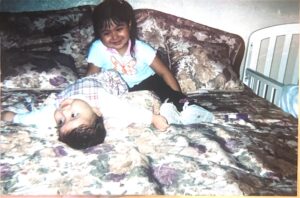
JBAY Youth Advocate Esme Nuno Mora was announced this month as the sole undergraduate recipient of this year’s UC Berkeley Chancellor’s Award for Civic Engagement in honor of her research and advocacy to support students who have experienced homelessness.
This award recognizes four individuals or student groups addressing urgent community needs beyond the UC Berkeley campus. Esme’s project focused on a segment of young people identified as unaccompanied homeless youth, of which there are over 10,000 in California, the most of any state. Esme advocated to add a checkbox to the UC application to specifically capture this status. The UC Office of the President accepted Esme’s pitch earlier this year and the new checkbox will go into effect this August for students applying for school fall 2026.
Originally from the small town of Moline, Illinois, Esme moved to California at age 15 with her younger sister after their mother passed away. “During my senior year of high school, I was identified as an unaccompanied homeless youth,” Esme says. “That simply means that I wasn’t in the care of a parent or guardian, and didn’t have fixed housing.”
Despite this designation, Esme ran into many obstacles as she attempted to find support. Told she was ineligible for foster youth-serving programs at two institutions of higher education, Esme networked and explained her situation over and over. When she applied to transfer to UC Berkeley in 2022, there was no way to note her status in the admissions process. “I felt like my circumstances were not recognized, like I was invisible,” she says.
Once at UC Berkeley, Esme was accepted into the Miller Scholars Program, which afforded her a grant for a research or community-based project. Esme knew she wanted to focus on building more targeted support for youth in circumstances similar to her own and quickly landed on the checkbox idea. She also joined Berkeley Hope Scholars, which connected her to JBAY’s then Director of Education, Debbie Raucher, as a mentor.
Esme had first learned of JBAY when she attended the Blueprint Conference the year prior and she became a JBAY Youth Advocate shortly thereafter. “I thought this project was going to be like a tap on the shoulder, like, ‘Oh hey, you forgot a checkbox,’” Esme remembers. “But it ended up being a two-year project that required going through so many hoops.”
JBAY helped Esme define an approach based on the fact that checkboxes for unaccompanied homeless youth already exist on CSU and community college applications. They advised in the framing and drafting of a formal memorandum to UC leadership and oriented Esme to the University system’s committee structure and levels of approval. “JBAY’s experience and expertise really helped me amplify my voice,” Esme says.
After two rounds of review and revision, the proposal was approved. “It just felt so surreal to know that another student is gonna feel validated and seen by the UC system,” Esme says of hearing the news. “These youth don’t deserve to be asking people or programs if they support them, the programs should be finding them, and the checkbox truly does that.” After checking the box, Esme aims to ensure students who fall into this category connect with other vital on-campus resources—things like priority housing and priority course registration.
Dr. Jill Berrick, a professor in UC Berkeley’s School of Social Welfare, supported Esme in the development of her “I Need a Box” project and nominated Esme for the Chancellor’s Award. According to the University, “Thousands of students, staff, and faculty devote hundreds of thousands of hours to direct service to the community, and even more hours to research and partnerships that serve the public interest” each year.
Esme is headed to Harvard for seven weeks this summer as a Public Policy and International Affairs Fellow and she plans to continue her advocacy for resources for young people across the country. “When it comes to homeless youth, there’s a direct pipeline right to adult homelessness, incarceration,” she says. “I really feel like higher education solves a lot of these issues, but unfortunately for these youth, following their dreams has become a privilege. I want to dismantle that through this work.”
It’s Esme’s mother who continually inspires her. “She was a single mom, immigrated here from Mexico. She worked really hard in labor intense factory jobs, and she really installed this idea that having an education gives you freedom,” Esme says. “She sacrificed everything for us till her last breath, to stay in the States, to go to school here, do something good, help our community.” Thanks to Esme’s work, when her sister applies to transfer into a UC next year, she will be able to check the box.
